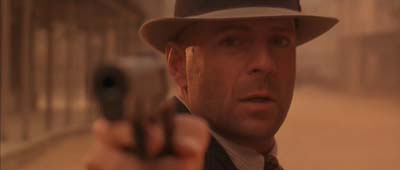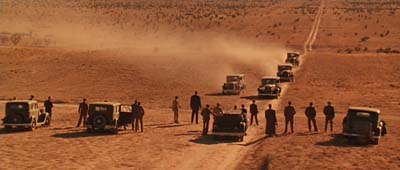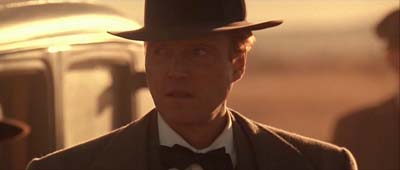Last Man Standing
Kurosawa with hats, booze, sand and large calibre automatics.

Director Walter Hill's canon is a mixed one. He has writing and directing credits on many classic movies (48 Hours and the original The Getaway), but has also shared equally in some right turds (Another 48 Hours and the remake of The Getaway, natch...). As a huge Bruce Willis fan, I was initially very sceptical about news of Hill directing him in a prohibition era gangster-western which was basically a remake of the classic Kurosawa movie Yojimbo. Hmmm...hadn't it been remade several times already, most notably as A Fistful Of Dollars? The odds of this relatively low budget production being any good seemed stacked against those involved, but don't you just know it, those crazy-ass bitches done gone and pulled it off. Smokin'...
Willis drifts into the quiet Tex-Mex border town of Jericho during the particularly dusty year of 1931. With alcohol a precious and profitable commodity, the town plays host to two rival gangs fighting to control the flow of liquor from across the border. The Italian gang is run by Strozzi (Ned Eisenberg), who, being Italian, is of course stylish and violently impetuous. The Irish (lead by David Patrick Kelly as Doyle) are, being Irish, down to earth and far more informal. So far so clichéd. Seeing his opportunity to make a wedge of cash, Willis announces himself as the superbly anonymous 'John Smith From Back East' and proceeds to play both sides against each other in wonderfully brutal fashion.
Those who have seen either Dollars or Yojimbo will pretty much know what to expect here, with the action of the previous films transposed pretty much wholesale. Bruce's naturally laconic style is superbly suited to his role, which he underplays to wonderful effect. His horizontal attitude is reflected in his new surroundings; a classic ghost town rendered reality by a population fleeing from the factions, and he manages to lend his character a suitable air of mystery.
'Diplomacy with a big stick' is the order of the day as Smith's plan is set in motion, except here the big stick is represented by Willis' two smoking Browning automatics which he wields simultaneously in the finest John Woo tradition. We first learn he's not a man to be trifled with when a bunch of Doyle's gorillas smash up his car on his arrival. Stopping only to down a quick whisky at the local bar, Smith heads off to Doyle's office where he politely suggests the offending goon perhaps pay for the damage. No surprises for guessing the idiot's response, and when he reaches for his gun Smith blows him quite spectacularly off his feet and roundly into into oblivion amidst a hail of .45 death.
Word soon spreads of Smith's apparent handiness with a shooter, and soon both sides are vying for his services. Unfortunately this pisses of Doyle's top gunman Hickey (a quietly psychotic Christopher Walken) who soon decides it'd be better for Smith to take an early nap, and the grudge match gradually escalates in violence until, you guessed it, there's only one man left standing. It's all a very straight forward journey, but thankfully Hill takes us on a superbly stylistic route.

Anyone expecting depth of content over style need not bother applying. For the most part the characters are woefully 2D, but nearly everyone involved manages to transcend the limitations of their role and this lends the movie a pleasantly unexpected depth. This is the kind of role that suits Willis to a tee. The man has made a career out of winking at the camera, and here he gets to emote all the charm, style and simmering danger he likes. The supporting players are mostly up to scratch as well, and the fact that nobody much other than Walken stands out is not an insult but more a compliment on some uniformly fine acting.
There's some superb camerawork on display and Director of Photography Lloyd Ahern can take a bow for framing some beautifully dusty scenes, whilst frequently making Texas look like the surface of Mars. There are some beautiful moments scattered throughout the film, and the overall look is certainly very photogenic.
Perhaps the most moody of the picture's facets is Ry Cooder's stunning score. This is truly the sound of arid, dusty death; all growling guitars that emote menace from every loosely-plucked string. Smith is a cool customer on the outside, but you know exactly what he's thinking when Cooder ramps up those notes. Yes, he's thinking that guy over there needs a helping hand auditioning for the part of a teabag in a Tetley commercial, and our Smith's just the dude to provide the perforations.
Last Man Standing's occasional bursts of uber-violence are simultaneously it's most stylish and disappointing aspects. Witness the afore-mentioned car-abusing nonce lifted off his feet and bowled fifty feet down the road. Sit stunned as Willis clears a room of bad guys single-handedly amongst the kind of gunshot effects that'll have your neighbours calling the police. Groan in disappointment as you realise his handguns are the magical type that need reloading a third as often as they should. Gun nuts will know the original Browning .45 auto has a clip that holds eight rounds. Here Willis empties twice that into each twat stupid enough to trifle with him without ever having to reload. It's this lack of realism that distances the viewer right in the midst of the parts which excite the most, and leave you feeling slightly cheated. In a movie that revels in understatement it represents a stupidly unnecessary excess, and you end up with the feeling that Walter Hill just can't help himself when guns are involved.

Last Man Standing largely took a pasting from the critics upon it's release, but on the home formats it's had time to settle down and what emerges is a sometimes subtle, sometimes brutal homage to the movies of yore with all the gunplay mod-cons you'd expect of a Hollywood actioner. There're little or no hidden metaphors here, just as there were few in Yojimbo or Dollars. It's a story of a man taking a calculated gamble and falling foul of his weaknesses (in this case women) before rebuilding himself and finding some kind of redemption.
There's plenty to enjoy and from a personal point of view I think this represents Willis' finest moment in some time. The general moody ambience, for which I'm a sucker, is superlative. I positively challenge anyone to watch this and not choke on the dust. For the most part Hill proves he can actually handle atmosphere and character interaction, which if we're being honest is not what he's famous for. It's just a shame his boyish firepower masturbation gets in the way, but at least it's loud.
It'd be extremely interesting if Kurosawa were around to give some insight on how his and Ryuzo Kikushima's story has mutated stylistically over successive iterations. Perhaps we can have some sort of subtitle-based Ouija commentary on future DVD releases like this? Or perhaps not.
I find myself wanting to embrace Last Man Standing because it's so damn misunderstood, and I reckon with a little love and attention it's really a fine piece of movie making. Certainly it has a big flaw or two, but if you're willing to soak up a little atmosphere in place of characterisation, and you can forgive excessive moments of ballistic intrusion, Last Man Standing might just take you by surprise. I enjoyed it immensely, so if that means anything to you at all then by all means give this a shot.
In granting the following award I acknowledge that I am indeed a big Willis fan, but I have tried not to let this sway my judgement. Out of a possible five rounds at my disposal, I have emptied four into the fools who called this film a 'ho'.
Christopher Walken (Hickey)
David Patrick Kelly (Doyle)
Ned Eisenberg (Fredo Strozzi)